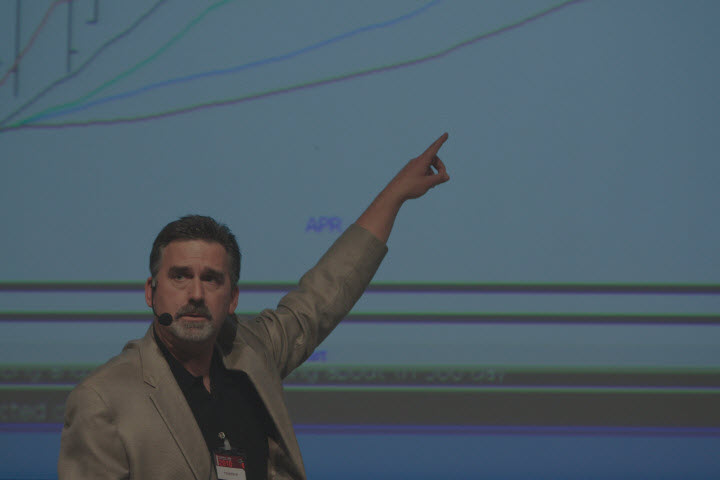
Why I Teach Trading And How That Benefits Both Me And You
By Dave Landry | Random Thoughts
Random Thoughts
I teach trading for both obvious reasons and not so obvious ones. You too can benefit from this, especially from the not so obvious reasons. Let’s explore this further.
I Teach Trading Because I Like Teaching

Years ago a friend nicknamed me “Mr. Information.” He actually had a shirt made for me that said just that along with a hat that read “Ask Me!” Although he liked to poke fun, I was the first he’d call anytime he needed information (see the Week In Charts for an amusing anecdote here)—this was long before the Internet.
I Teach Trading Because I Make Money Teaching Trading

Let me be frank, although I do help a lot of people that have never spent a dime (and may never spend a dime), I’m not completely altruistic. I do make money teaching. And, getting to see the world in the process doesn’t suck either.
The money for how to make money vs. keeping it for yourself argument comes to mind. If you had a goose that laid golden eggs, why would you sell it? And, I fully agree. If it were easy to, and I quote, “turn $5k into $500k” then that’s all I’d do, rinse and repeat. It’s not. Like in life, if it sounds too good to be true, it probably is.
So what am I selling? I’m “selling” hard work and common sense. I’m selling something that makes sense conceptually. I’m selling seeking to identify emerging or existing trends and figuring out a way to get on board them. Then, once on, mitigating losses if I’m flat out wrong, taking partial profits in case I'm only partially right, and hopefully (I know, "hope") staying with trends that persist for a long long time. This is something that has worked for 100s of years, even 1,000s if you look at old world commodities. And, since catching a trend is the only way to profit from a trade, finding and getting aboard trends makes a lot of sense.
I Teach Trading Because I Learn While I Teach
It’s been said that if you want to get better at something, you teach it. I fully agree! The constant questioning makes me think and re-think about my answers. I want to make sure that anything I say is conceptually correct. I certainly don’t want to look like an idiot (although I am okay being known as a trend following moron).
Many are surprised when they discover that I actually answer all of my own emails (admittedly, sometimes eventually!). Last time I counted (2010 while working on Layman’s), I had replied to over 30,000 emails. It's probably well over 100k now but at the least, it’s safe to say that it’s a bunch. This helps me to cement the process and reduce it down to its essence.

Being up on stage in front of the big screen, I’ve seen things that I didn’t notice as much on my small screens. For instance, seeing a 4 foot short-term persistent move made me realize that even short-term persistency of trend can be quite powerful. This is especially true during emerging trends or base breakouts. As another example, it has re-affirmed the power of moving average daylight. Seeing the price bars six feet above the moving average is quite the eye opener.
I Teach Trading Because It Makes Me Work Harder

Trust me, on a crappy day, if I didn’t have clients depending on me, more-than-likely, I’d walk away from my screens and have a few beers. Instead, I put my nose to the grindstone to make sense of everything. Not every day but often I see that it wasn’t nearly as bad as I initially thought and felt. Many times, it’s just the normal ebb and flow. And, sometimes, I ended up scratching out or even slightly in the black. Further, by doing the work because others are depending on me, I work hard to make sure that I leave no stone unturned-I practice deliberate practice (Google it). I must exhaust all possibilities because people are watching. I must then weigh that against that no choice-doing nothing-which, btw, is always a choice that must be strongly considered before putting capital into harm's way. Primum noncere-to you or me-comes to mind (first, do no harm).
Surprisingly, I occasionally find great opportunities when I don’t really feel like doing the work due to lackluster conditions-but have to because of you. For instance, back in February when the markets were pretty crappy (and quite frankly, they really haven’t improved since!) a client emailed me to tell me he was taking a break from my Core Trading Service because “he could not see any setups for the foreseeable future.” And, quite frankly, neither could I. Yet, literally, that same day, I found 2 setups. Both went on to hit the initial profit target (roughly 34%) and we’re still in longer-term trend following mode on one of them (up nearly 70%..well, at least before today's open, LOL). I know people wonder what the world would be like without hypothetical questions but I do have to wonder if I would have still done a thorough analysis, given the conditions if it were just for me. Would I have found 2 beers instead of these 2 trades?
I Teach Trading Because You Make Me Want To Be A Better Me

I teach because it forces me to practice what I teach and preach.
In good conscience, I can’t tell you to not fight trends and then go out and pick tops and bottoms. I can’t tell you to honor your stops and then ride stocks into bankruptcy. I can’t tell you to just follow the plan and then just wing it. It's a constant voice in my head telling me what I have to do. BTW, it's a good thing I work alone because I'd bet that the voices in my head would bother my co-workers (that plus me heating up leftover fish in the microwave for lunch).

I once had a bunch of positions on that were doing exceptionally well. If fact, things were going so well that I actually found myself somewhat frozen as I stared at my screens. Right about that time, my wife Marcy popped her head into my office. I informed her of the good news but then said that I’m not exactly sure what to do. She quickly quipped “Well, what would Dave Landry do?” She then turned on her heels and walked away. I growled a bit and then thought, well, what would Dave Landry do? "Dave Landry" promptly began taking partial profits and trailing stops higher.
I Teach Trading For Ego Purposes

There’s certainly some filling the Maslow’s hierarchy of needs going on. Don’t worry, I’m not going to go all freshman psychology on you. A few things though: Helping others realize their goals and dreams is rewarding. If I can make others successful then I become more successful in the process. This helps my ascent up Maslow's ladder.
Is There A Lesson For Me In All This?
Absolutely! Deliberate practice as if someone is depending on you will make you better, much better. Don’t just look at charts. Look at charts and ask yourself, could I have caught this move? Should I have?—while at the same time realizing that you can’t kiss all the women and no methods work all of the time. Make sure that you exhaust all possibilities. If you do find potential opportunities make sure that you study overall conditions so that you have a little tailwind to begin with. And, if you don't, make sure that you have the mother-of-all setups. If not, it's okay to pass. Provided that you worked hard, you can walk away with a good feeling that you're doing the right thing. And, then have those 2 beers.
Holding yourself accountable, even if only to yourself, will make you a better trader. It’ll force you to cement your methodology, and, here comes the cliché: plan your trade & trade your plan. For you married guys, if you’re brave enough, show your wives what you are doing. I read a study (Montier?) where men who got their wives involved in their trading became more successful. Unfortunately, just the opposite happened when wives got their husbands involved in their trading. As I have written before, ego trumps emotion when it comes to the pitfalls of trading. If you do decide that your marriage can’t survive a trading partnership then work to become better, even if no one is watching. Or, find a motivated partner and play off each other’s strengths and help each other with their weaknesses.
And Now, Something Completely Different (Hence The Column Name “Random Thoughts”)
From a teaching standpoint, I honestly don’t think I have any competition in this business. I’m not saying that to be flippant. Most aren’t out there teaching being prudent, sitting on your hands when there’s nothing to do, and working hard to fix you. Sure they are few. And, some of my clients are their clients too.
The reason this comes to mind is yesterday while cleaning out my inbox I clicked on a video blog post (from a website software company) that said that you should check out your competition from a website design standpoint. So, I did. My A.D.D. kicked in as soon as I got to a popular trader's website. I began reading the blogs vs. checking out the site. Long story endless, I couldn’t help read a post there from someone who was mentally challenged (and that’s really an insult to the mentally challenged). He was suggesting playing the Brexit by buying calls and selling puts to finance the trade. Unbelievable. Let me get this straight, let’s put on a trade with unlimited risk and a binary outcome-50/50 at best? I feel for the poor bastards that took that bait. Anyway, that’s exhibit A. I have no competition to speak of. I do speak of those who I respect quite often. And, they speak of me too for which I am humbled. So, if anything, my relationship with the few realist out there is collegial not competitive.
To The Markets

Earlier this week exemplifies why you should not get too caught up in the news. A poll showing that Britain would not exit from the E.U. turned out to be as useful as tits on a boar hog.
I think the market is vastly over reacting. In fact, so far, it’s been a really nice OGRe (opening gap reversal, watch yesterday’s Dave Landry’s The Week In Charts for a lesson here). And, if we do continue to slide it was in the cards anyway. You can’t blame it on Brexit. This is why I’ve been so cautious while the market has been treading water for over a year.
So What Do We Do?
Don’t stress over the news. Trust me, there will be something new to worry about tomorrow. Do honor your stops and be selective on new positions. Now you know why I have been cautious for so long. If conditions are not conducive then you sit on your hands. If you’ve been following along then you’ll know that we have been super selective, almost to a point of boredom. I would never feel schadenfreude in this business but with only a small part of the portfolio at risk, it is nice to be able to keep my head while everyone else is losing theirs. I’m not bragging. As someone who teaches trading, I'd be remiss to overlook this teachable moment: Be prudent and selective, especially as a trend follower when there is no trend to follow.
May the trend be with you!

Dave Landry

